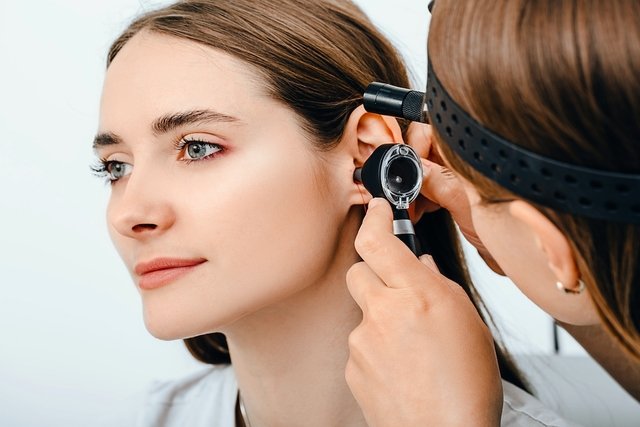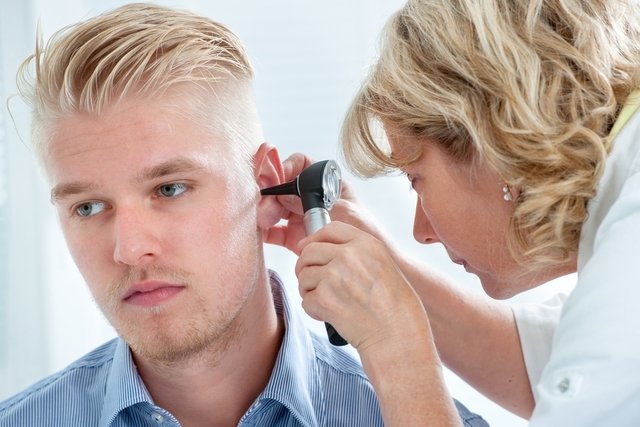Labyrinthitis can be caused by virus or bacterial infection, allergies, medication use, excess stress and anxiety, chronic illnesses or be a consequence of temporomandibular disorders (TMJ).
Labyrinthitis is the inflammation of an internal structure of the ear, the labyrinth, which is responsible for hearing and body balance, being more common in the elderly, although it can occur at any age, leading to the appearance of symptoms such as dizziness, vertigo, nausea or feeling unwell. Know how to identify all the symptoms of labyrinthitis.
In the presence of symptoms of labyrinthitis, it is important to consult an otorhinolaryngologist, neurologist or general practitioner, so that tests can be carried out, the cause identified and the most appropriate treatment initiated, which may include changes in eating habits or the use of medicines such as antibiotics, antivirals or antiemetics, for example. Find out how labyrinthitis is treated.

Main causes
The main causes of labyrinthitis are:
1. Viral infections
Some viral infections, such as flu, colds, measles, mumps, glandular fever, polio, rubella, herpes zoster or herpes simplex, can cause inflammation in the vestibulocochlear nerve or the labyrinth, and lead to the appearance of labyrinthitis symptoms, such as dizziness, loss of balance, nausea or ringing in the ears.
What to do: It is important that the otorhinolaryngologist is consulted so that the cause can be confirmed and treatment can be initiated, which may involve rest, use of medication for vertigo and/or antivirals to combat the virus infection.
2. Bacterial infections
Labyrinthitis can also appear as a result of a chronic bacterial infection in the middle ear, which can spread to the inner ear and lead to labyrinthitis symptoms, as well as causing chronic dizziness, excessive tiredness, disorientation, ringing in the ear or loss of sound. hearing loss, especially when the infection is not treated properly.
Furthermore, although it is rarer, labyrinthitis can also occur due to bacterial meningitis, for example. See other types of meningitis and how it is treated.
What to do: In this case, the otorhinolaryngologist may recommend the use of antibiotics to combat the infection and thus alleviate the inflammation. Furthermore, depending on the intensity of the symptoms, the use of medications to relieve nausea and dizziness may also be indicated.
3. Allergies
Labyrinthitis can be caused by allergies to dust, pollen or animal hair, for example, as they increase the production of histamine in the body, which is responsible for allergic symptoms, such as a blocked nose, constant sneezing, coughing or post-nasal drip.
This is because due to excess secretions, such as mucus or phlegm, they can cause blockage of the auditory tube, which is a small channel that connects the nasal sinuses to the ear, and lead to inflammation of the vestibular system in the inner ear and the emergence of labyrinthitis.
What to do: If it is confirmed by the otorhinolaryngologist that the labyrinthitis is related to an allergy, the use of antihistamines and/or corticosteroids may be indicated, depending on the intensity of the symptoms.
4. Temporomandibular joint dysfunction (TMJ)
Temporomandibular joint dysfunction (TMJ) is another cause of labyrinthitis and occurs due to a change in the joint that connects the jaw to the jaw, from clenching the teeth too much during sleep or from a blow to the joint region. Furthermore, other factors can contribute to the emergence of temporomandibular disorder, such as changes in emotional state or genetic factors, for example.
This joint is responsible for the movement of opening and closing the mouth, and when there is any change it can affect the auditory nerves and lead to the appearance of labyrinthitis symptoms, such as dizziness, vertigo or ringing in the ears.
What to do: In this case, it is important that in addition to the otorhinolaryngologist, the dentist is consulted so that the cause of the TMJ is identified and the best treatment can be advised, which may involve the use of a bite plate to sleep, physiotherapy and the use of medications to relieve the symptoms. Check out more details about TMJ treatment.
5. Anxiety or stress
Labyrinthitis can also occur as a consequence of stress and anxiety, being called emotional labyrinthitis, caused by inflammation of the nerves in the ear or labyrinth, due to emotional changes, which leads to changes in balance, dizziness and headache. which worsens when you make very sudden movements with your head. Find out more about emotional labyrinthitis.
What to do: It is important to adopt measures that help you relax and thus alleviate symptoms of anxiety and stress, such as practicing physical activity, doing aromatherapy and resting, for example.
6. Chronic illnesses
Some chronic diseases such as diabetes, high blood pressure, anemia or thyroid problems such as hypothyroidism, for example, can affect the vestibular system or auditory nerves, leading to labyrinthitis.
What to do: It is recommended that the doctor be consulted so that the diagnosis can be confirmed and the most appropriate treatment for the situation can be initiated, which is normally done with the use of specific medications and changes in eating habits.
7. Use of medications
Some medications, such as acetylsalicylic acid, quinine, chloroquine, furosemide or bumetanide, can cause temporary intoxication in the labyrinth, located in the inner ear, and cause labyrinthitis.
Furthermore, some antibiotics, such as gentamicin, streptomycin, neomycin or tobramycin, or chemotherapy drugs, such as cisplatin or carboplatin, for example, can also cause permanent toxicity in the hair cells within the inner ear and the vestibulo-cochlear nerve, and symptoms of imbalance, dizziness or even hearing loss.
What to do: If labyrinthitis is being caused by the use of medication, it is important that the doctor is notified so that the possibility of suspending the medication, replacing or changing the dose can be assessed.
8. Head trauma
Head trauma or blows to the head, even if they do not directly affect the ear, can lead to labyrinthitis, by affecting the auditory nerves or causing parts of the ear canal to become loose, moving the inner ear, leading to symptoms such as dizziness or vertigo.
What to do: It is essential that a neurologist is consulted to identify the type of head trauma and its severity, as treatment can then be initiated, which may involve the use of medication to alleviate pain or surgery, in the most serious cases. Understand how head trauma is treated.
9. Brain or ear tumors
The presence of a tumor in the brain or ear, such as acoustic neuroma, which is a type of benign tumor, can cause labyrinthitis that can affect one or both ears, and is usually accompanied by other symptoms such as pain or a tingling sensation or numbness in the ear or face, headache, dizziness or loss of balance.
Additionally, nasopharyngeal cancer, a type of malignant tumor that affects the back of the nostrils and mouth, can also cause labyrinthitis or ear infection and even hearing loss.
Generally, in addition to labyrinthitis, some signs that may indicate a tumor in the brain or ear are nausea, vomiting, changes in vision or even seizures.
What to do: It is important to follow the treatment advised by the oncologist, which usually involves chemotherapy or radiotherapy, in addition to surgery, in some cases.
10. Life habits
Some lifestyle habits, such as excessive consumption of alcoholic beverages, coffee, soft drinks, chocolate, or fatty foods, can increase the risk of labyrinthitis attacks, as they can cause inflammation in the inner ear. Furthermore, smoking can also cause labyrinthitis.
What to do: In these cases, it is important to pay attention to eating habits, identifying the foods that cause labyrinthitis attacks so that they can be avoided on a daily basis.
How to confirm the diagnosis
The diagnosis of labyrinthitis is made by a general practitioner, otorhinolaryngologist or neurologist through a clinical examination, in which the presence of signs indicating inflammation in the ear is assessed. In addition, the doctor may recommend audiometry to check for hearing loss and check for other inner ear diseases, such as Ménière’s syndrome.
Taking care of your health has never been easier!
It is also possible for the doctor to carry out some tests to check how the person feels when making certain head movements, that is, if the person feels dizzy and vertigo, thus making it possible to identify labyrinthitis. In addition, the ENT doctor may also order tests such as MRI, CT and blood tests to identify the cause of labyrinthitis.

Sign up for our newsletter and stay up to date with exclusive news
that can transform your routine!
Warning: Undefined array key "title" in /home/storelat/public_html/wp-content/plugins/link-whisper-premium/templates/frontend/related-posts.php on line 12
Warning: Undefined array key "title_tag" in /home/storelat/public_html/wp-content/plugins/link-whisper-premium/templates/frontend/related-posts.php on line 13




